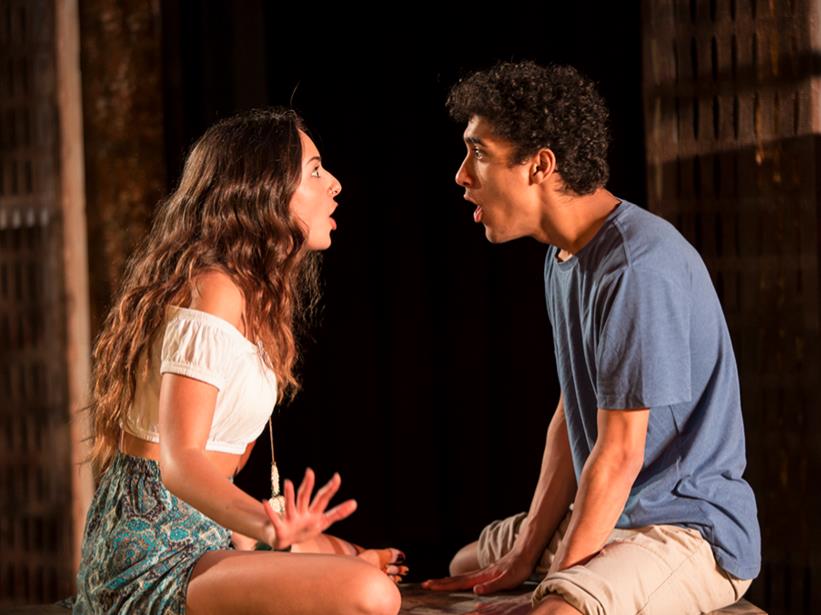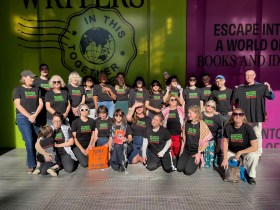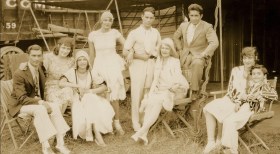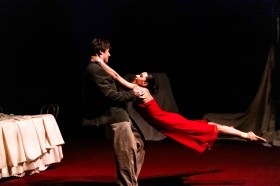Image: AFTT student production of Lucky.
Life doesn’t come with a script. We are all actors in a play with no rehearsals, an unreliable cast and a wobbly set.
Improvising in the face of uncertainty is always a challenge. But Andrew Lindsay, who teaches students improvisation techniques in the Diploma of Stage and Screen Acting offered at the Academy of Film, Theatre and Television, has noticed that the skills his students learn have off-stage application to their careers and broader life skills.
‘In one way, our whole lives are one long extended improvisation in the sense that we are always making it up as we go along,’ he said.
Improvisation contains life lessons, not just for actors but for anyone, particularly in the erratic world of the arts.
Lesson 1: Be open
One of the most important lessons in improvisation is be open to the exploration it encourages.
‘I think if you break the word improvisation down into its components you get something like ‘the unforeseen’. And I think improvisation is precisely the ability to be willing to explore what you don’t already know and to discover things that you don’t already know,’ said Lindsay.
Find out more about Stage and Screen Acting courses at AFTT
Lesson 2: Be willing to fail
In improv, as in life, there is no guarantee that the choices or risks you take will work. But don’t let that stop you. ‘You need to be willing to take a creative risk,’ said Lindsay.
Willingness to take risks means accepting that you will sometimes fail but once you are willing to fail your chances of succeeding creatively increase.
Lesson 3: Go with your gut
Improvisation teaches us to switch off learned responses and habitual actions and rediscover the instinct that is at the core of creative expression.
When teaching the movement and improvisation module ‘Expressive Body’ at AFTT Lindsay often sees students discover they are more creative than they first thought. ‘We all have creative potential and very often we have much more creative potential than we are willing to believe. Often we are timid or we have never had the opportunity to explore these parts of ourselves.’
Deliberate thinking, while valuable in a lot of contexts, doesn’t teach us to think creatively. Creativity happens when we switch off our analytical thinking and move towards expressive thinking.
Lesson 4: Live in the moment
Stop reading the book on mindfulness and start practicing improvisation techniques that encourage you to live in the moment.
For many actors and artists, life experience is an important part of creating new work. Living in the moment and trying new things can unearth wonderful new ideas. Draw on everyday experiences, nature and personal contacts to fashion your craft out of the found objects of your life.
Lesson 5: Say yes
The fundamental rule of improve is to accept an offer. If an improv partner says, ‘Oh look, here’s an alien landed in a spaceship,’ you go with that, you don’t insist on a realistic scenario.
Accepting offers of new experiences, talking to new people, or just truly listening to a different perspective without gainsaying provides opportunities to extend and enrich your life. You don’t have to say yes to everything, but the expectation that you will respond positively to whatever is offered is a remarkable change from the evaluative, skeptical and logical responses encouraged by an academic education.
Lesson 6: Play
At AFTT students are given a theme or a provocation to work with as a place to start the improvisation. For one of these, Lindsay asks students to pick a single body part. He then gets students to start exaggerating their movement by making this one body part lead the whole body. For example, the nose or the shoulders take control of the entire body and this is where the movement begins.
This encourages students to find a new way of moving which makes them aware of a new rhythm and different dynamic that they can use to create a character.
Just playing at being a different person, in private if you prefer, can help you find parts of yourself you didn’t know existed.
Discover more about AFTT courses and training
If you are interested in finding out more about the courses on offer at The Academy of Film, Theatre and Television visit http://www.aftt.edu.au/courses
The Essential Skills Series is brought to you in partnership with the Academy of Film, Theatre and Television.





